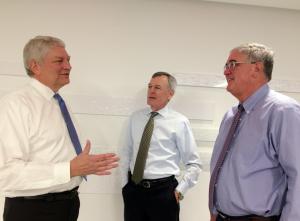Southern Company's Art Beattie:

When we look at the next five years, we mainly focus on principles. Principles that have served us well to get us where we are today. That begins with the fundamentals. Making sure our customers are well served. That we provide them clean, safe, affordable, reliable energy.
We think that's a standard that won't change over the coming years. People are using energy in a different way and we're having to adapt to those changing needs. Either the way we bill them or serve them, and the way we communicate with them.
... We have to remember how we got there. We got there by satisfying our customers. If we can't satisfy our customers, it's unlikely we'll be able to have successful financial results in terms of our balance sheets, and in terms of our prospects for attracting capital into our business.
... The real challenge that I want to focus on is cost control. Because we've got to make sure that we manage our rates, and that's one of our most important principles going forward - affordable energy.
We can't get in the habit of going back to our regulators and saying, "well, our sales [growth is] zero, therefore, we've got to charge more."
Dominion's Mark McGettrick:
The companies in this industry are not marketers typically. They're infrastructure companies, and they'll always be infrastructure companies.
So, the question is, how much advancement can you make, and where do you draw the line on enhancing the services you can provide? Are you going to go beyond the meter with products and services?
There will be some companies that try to take this approach. Other companies will rely more on their expertise in infrastructure to continue to support the needs of gas and electric customers.
... I think people underestimate still the speed at which solar is being developed. The grid itself is not designed to support this distributed type of solar generation.
With the advent of lower cost technology, you're going to have a lot of investment to adapt the grid to support a much higher level of renewables. That's going to put pressure on rates, which we're going to have to manage carefully.
Duke Energy's Steve Young:
Particularly on the electric side, we see organic load growth around maybe one-half of one percent a year. That's very different than it was a generation ago, obviously.
That then leads to a very different model for growing the business. And it shifts away from generation assets that were so necessary when you saw five percent growth per year, to more of grid-oriented investments for reliability and customer interaction.
That brings me to the second challenge we face. If you're shifting to those types of investment opportunities, and you're facing a low load growth paradigm, then the regulatory recovery mechanisms are the next challenge. Because they've got to change.
The regulatory recovery mechanisms of base rate cases typically have been timed with the completion of a large generation plant, where it was generation-focused, and there was lots of load growth to carry it between these rate cases.
Now as we make smaller, but more numerous, incremental grid-type investments, or even smaller combustion turbine-type investments on the generation side, you've got to have more interaction with the regulatory bodies.
The magazine for commentary, opinion and debate on utility regulation and policy since 1928, Public Utilities Fortnightly. "In PUF, Impact the Debate."
Steve Mitnick, Editor-in-Chief, Public Utilities Fortnightly
E-mail me: mitnick@fortnightly.com

